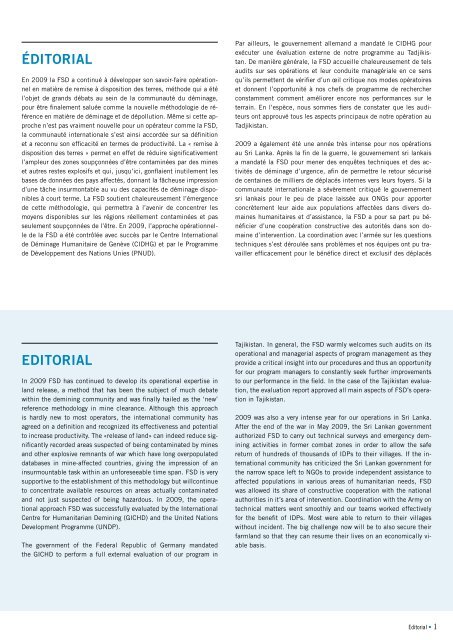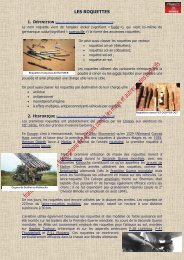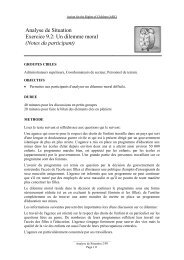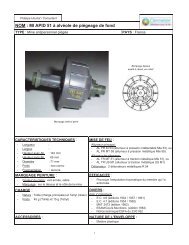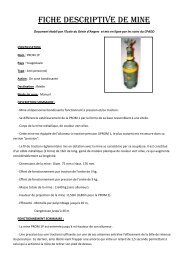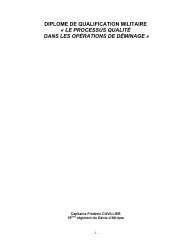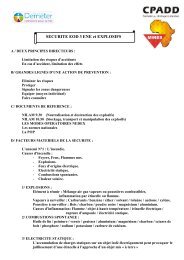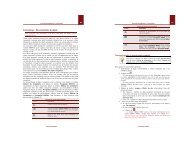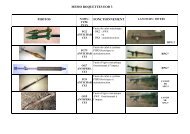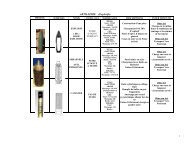RappoRt annuel annual RepoRt 2009 - BIBLIOMINES
RappoRt annuel annual RepoRt 2009 - BIBLIOMINES
RappoRt annuel annual RepoRt 2009 - BIBLIOMINES
You also want an ePaper? Increase the reach of your titles
YUMPU automatically turns print PDFs into web optimized ePapers that Google loves.
Éditorial<br />
en <strong>2009</strong> la FSD a continué à développer son savoir-faire opérationnel<br />
en matière de remise à disposition des terres, méthode qui a été<br />
l’objet de grands débats au sein de la communauté du déminage,<br />
pour être finalement saluée comme la nouvelle méthodologie de référence<br />
en matière de déminage et de dépollution. Même si cette approche<br />
n’est pas vraiment nouvelle pour un opérateur comme la FSD,<br />
la communauté internationale s’est ainsi accordée sur sa définition<br />
et a reconnu son efficacité en termes de productivité. La « remise à<br />
disposition des terres » permet en effet de réduire significativement<br />
l’ampleur des zones soupçonnées d’être contaminées par des mines<br />
et autres restes explosifs et qui, jusqu’ici, gonflaient inutilement les<br />
bases de données des pays affectés, donnant la fâcheuse impression<br />
d’une tâche insurmontable au vu des capacités de déminage disponibles<br />
à court terme. la FSD soutient chaleureusement l’émergence<br />
de cette méthodologie, qui permettra à l’avenir de concentrer les<br />
moyens disponibles sur les régions réellement contaminées et pas<br />
seulement soupçonnées de l’être. En <strong>2009</strong>, l’approche opérationnelle<br />
de la FSD a été contrôlée avec succès par le Centre International<br />
de Déminage Humanitaire de Genève (CIDHG) et par le programme<br />
de Développement des nations unies (pnuD).<br />
editorial<br />
In <strong>2009</strong> FSD has continued to develop its operational expertise in<br />
land release, a method that has been the subject of much debate<br />
within the demining community and was finally hailed as the ‘new’<br />
reference methodology in mine clearance. although this approach<br />
is hardly new to most operators, the international community has<br />
agreed on a definition and recognized its effectiveness and potential<br />
to increase productivity. the «release of land» can indeed reduce significantly<br />
recorded areas suspected of being contaminated by mines<br />
and other explosive remnants of war which have long overpopulated<br />
databases in mine-affected countries, giving the impression of an<br />
insurmountable task within an unforeseeable time span. FSD is very<br />
supportive to the establishment of this methodology but willcontinue<br />
to concentrate available resources on areas actually contaminated<br />
and not just suspected of being hazardous. In <strong>2009</strong>, the operational<br />
approach FSD was successfully evaluated by the International<br />
Centre for Humanitarian Demining (GICHD) and the united nations<br />
Development programme (unDp).<br />
the government of the Federal Republic of Germany mandated<br />
the GICHD to perform a full external evaluation of our program in<br />
par ailleurs, le gouvernement allemand a mandaté le CIDHG pour<br />
exécuter une évaluation externe de notre programme au tadjikistan.<br />
De manière générale, la FSD accueille chaleureusement de tels<br />
audits sur ses opérations et leur conduite managériale en ce sens<br />
qu’ils permettent de vérifier d’un œil critique nos modes opératoires<br />
et donnent l’opportunité à nos chefs de programme de rechercher<br />
constamment comment améliorer encore nos performances sur le<br />
terrain. En l’espèce, nous sommes fiers de constater que les auditeurs<br />
ont approuvé tous les aspects principaux de notre opération au<br />
tadjikistan.<br />
<strong>2009</strong> a également été une année très intense pour nos opérations<br />
au Sri Lanka. Après la fin de la guerre, le gouvernement sri lankais<br />
a mandaté la FSD pour mener des enquêtes techniques et des activités<br />
de déminage d’urgence, afin de permettre le retour sécurisé<br />
de centaines de milliers de déplacés internes vers leurs foyers. Si la<br />
communauté internationale a sévèrement critiqué le gouvernement<br />
sri lankais pour le peu de place laissée aux onGs pour apporter<br />
concrètement leur aide aux populations affectées dans divers domaines<br />
humanitaires et d’assistance, la FSD a pour sa part pu bénéficier<br />
d’une coopération constructive des autorités dans son domaine<br />
d’intervention. la coordination avec l’armée sur les questions<br />
techniques s’est déroulée sans problèmes et nos équipes ont pu travailler<br />
efficacement pour le bénéfice direct et exclusif des déplacés<br />
tajikistan. In general, the FSD warmly welcomes such audits on its<br />
operational and managerial aspects of program management as they<br />
provide a critical insight into our procedures and thus an opportunity<br />
for our program managers to constantly seek further improvements<br />
to our performance in the field. In the case of the Tajikistan evaluation,<br />
the evaluation report approved all main aspects of FSD’s operation<br />
in tajikistan.<br />
<strong>2009</strong> was also a very intense year for our operations in Sri lanka.<br />
after the end of the war in May <strong>2009</strong>, the Sri lankan government<br />
authorized FSD to carry out technical surveys and emergency demining<br />
activities in former combat zones in order to allow the safe<br />
return of hundreds of thousands of IDps to their villages. If the international<br />
community has criticized the Sri Lankan government for<br />
the narrow space left to nGos to provide independent assistance to<br />
affected populations in various areas of humanitarian needs, FSD<br />
was allowed its share of constructive cooperation with the national<br />
authorities in it’s area of intervention. Coordination with the army on<br />
technical matters went smoothly and our teams worked effectively<br />
for the benefit of IDPs. Most were able to return to their villages<br />
without incident. the big challenge now will be to also secure their<br />
farmland so that they can resume their lives on an economically viable<br />
basis.<br />
Editorial • 1


